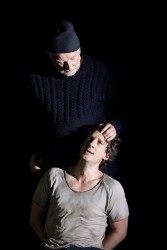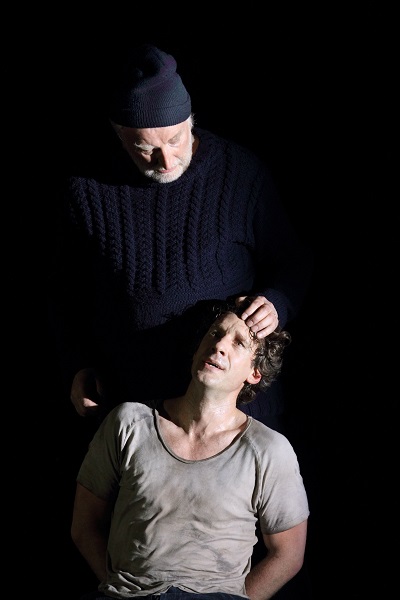 United Kingdom Britten, Billy Budd (1960 two-act revised version): Soloists, Chorus & Orchestra of the Royal Opera House, Covent Garden / Ivor Bolton (conductor). Royal Opera House, Covent Garden, London, 23.4.2019. (CC)
United Kingdom Britten, Billy Budd (1960 two-act revised version): Soloists, Chorus & Orchestra of the Royal Opera House, Covent Garden / Ivor Bolton (conductor). Royal Opera House, Covent Garden, London, 23.4.2019. (CC)

(c) Catherine Ashmore
Production:
Director – Deborah Warner
Set – Michael Levine
Costumes – Chloé Obolensky
Lighting – Jean Kalman
Choreographer – Kim Brandstrup
Cast:
Billy Budd – Jacques Imbrailo
Captain Vere – Toby Spence
John Claggart – Brindley Sherratt
First Mate – Ross Ramgobin
Second Mate – Simon Wilding
Mr Flint – David Soar
Bosun – Alan Ewing
Donald – Duncan Rock
Maintop – Konu Kim
Novice – Sam Furness
Squeak – Alasdair Elliott
Mr Redburn – Thomas Oliemans
Lieutenant Ratcliffe – Peter Kellner
Red Whiskers – Christopher Gillett
Arthur Jones – Thomas Barnard
Novice’s Friend – Dominic Sedgwick
Dansker – Clive Bayley
Any successful performance of Billy Budd needs to persuade one that this is the greatest of all Britten operas; and Deborah Warner’s production, coupled with Ivor Bolton’s conducting and some stand-out operatic performances, succeeds. This despite the odd caveat (some occasional untidiness in the orchestra). David Alden’s Billy Budd for ENO back in 2012 was in itself remarkable (review), Edward Gardner marshalling his forces expertly. The impressive 2013 Glyndebourne performance in its BBC Proms outing the following year was similarly stirring, and featured a couple of constants with the Royal Opera: Jacques Imbrailo in the title role and Brindley Sherratt as John Claggart (review). There must be something in the piece that brings out the best in all concerned.
The piece was premiered at Covent Garden in 1951; it is, incredibly, some two decades since it was last heard here. Why? The very same question could be asked as to why the two previous pit-stops for Warner’s staging prior to London – the Téatro Real in Madrid (review), where Bolton is Music Director, and the Téatro dell’Opera di Roma (review) – were both presenting the work for the very first time.
Warner’s staging is magnificent. Set designer Michael Levine offers a lattice of ropes and ladders, floating panels (decks) that move up and down (at one point highly effectively to describe the descent to the lower part of the ship). These design features, married with Jean Kalman’s simply superb lighting, are highly effective and atmospheric. The sea is notably absent, only a central channel and some lighting effects giving us placement – a similar loss of a key watery element was felt in Stefan Herheim’s Glyndebourne Pelleas in Summer last year (review). As the audience enters, an old man is visible onstage – Vere in later life, ready for the Prologue? Perhaps he is Vere’s outer shell, as it is the actual Vere – sung by the superb Toby Spence, not looking anything like the old Vere – that is intended to bookend the work.
This is an all-male opera, and undercurrents of homoeroticism in the attraction held by Billy and the power dynamics are here kept smouldering under the surface, restrained gestures achieving extraordinary power. The religious elements (most notably the Pontius Pilate-like abdication of responsibility of Vere, but also Billy as innocent sacrificial lamb) were, too, there to be extricated by the audience rather than shoved in their faces.
On one level this Billy Budd is a company effort in the superb male chorus contributions and the expert communications between all of the cast. On another level, the role assumptions of Imbrailo, Spence and Sherratt are frequently breath-taking. Before we get to the main roles, though, an acknowledgement should be made of the superb Dansker of Clive Bayley. He absolutely inhabited the role of the old sea dog, the voice of experience on board the HMS Indomitable, his final encounter with Billy at the end of the second act incredibly poignant.
That Billy of Jacques Imbrailo is superbly assured; every nuance is carefully considered, lived in and lived with, and the cumulative effect is remarkable. I enjoyed Imbrailo’s Zurga (Pêcheurs de Perles, ENO, 2016: review) but this performance took him into a different league. Billy’s emotional journey is huge in this performance, from his press ganging through to his tragic end with myriad stages in between. Imbrailo’s ‘Billy in the Darbies’ was heart-stoppingly beautiful, the flute commentaries infinitely lonely, a time-stopping realisation of some of Britten’s most effective music. Toby Spence commanded the stage as the conflicted Vere, his refusal to give counsel as to the fate of Billy in the work’s second act infinitely touching, his voice elastic and expressive throughout the evening.
Bass Brindley Sherratt was a dark incarnation of the Master-at-Arms, John Claggart. Rock-solid in both voice and stage presence, he completed a trio at the height of their powers. Of the smaller roles, Sam Furness’s Novice carried appreciable power, while Alasdair Elliott’s Squeak was confident.
The trajectory of the piece is expertly steered by Ivor Bolton, the orchestra boasting perfectly controlled high strings, and brass of breath-taking power. While one could hear references to works outside of Budd – the snoring soldiers of Wozzeck in Act II, perhaps – Bolton ensured we heard the sheer concentration of Britten’s score. It is a long evening (perhaps it should start at 7pm?) that somehow seems concurrently not so through its demands on the audience. This is not an easy evening, but it is an unforgettable one.
Colin Clarke
For more about what is on at the ROH click here.
